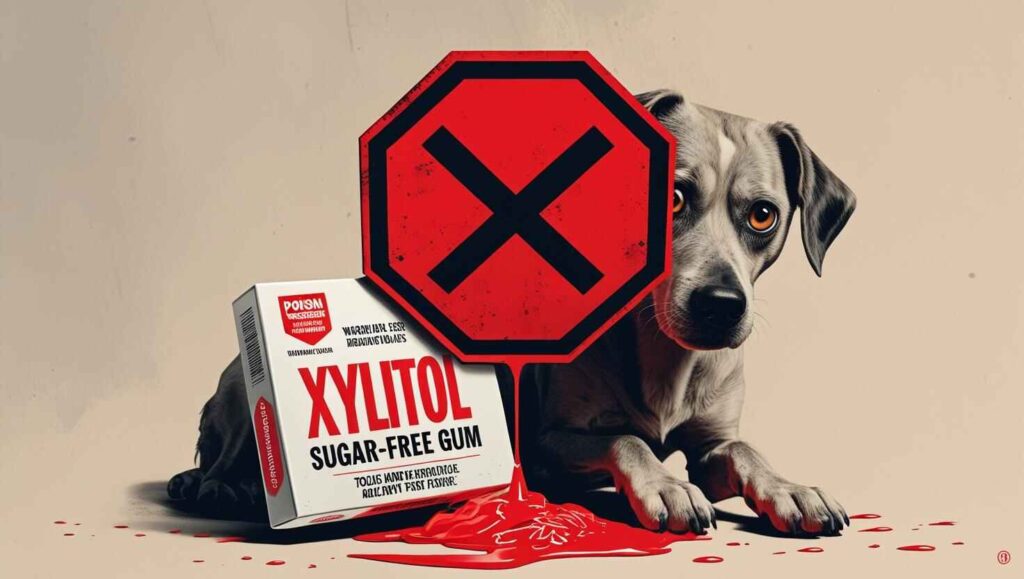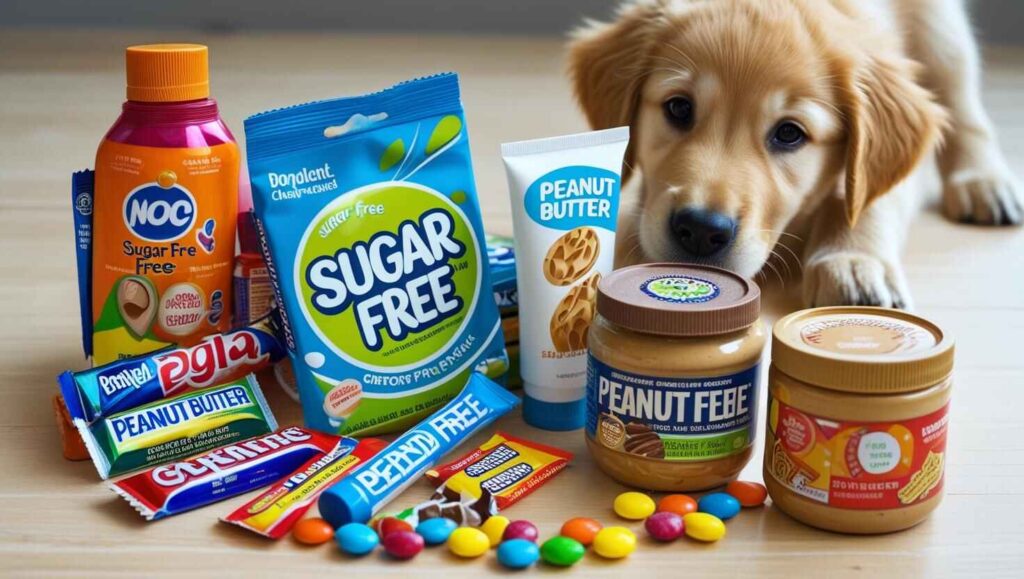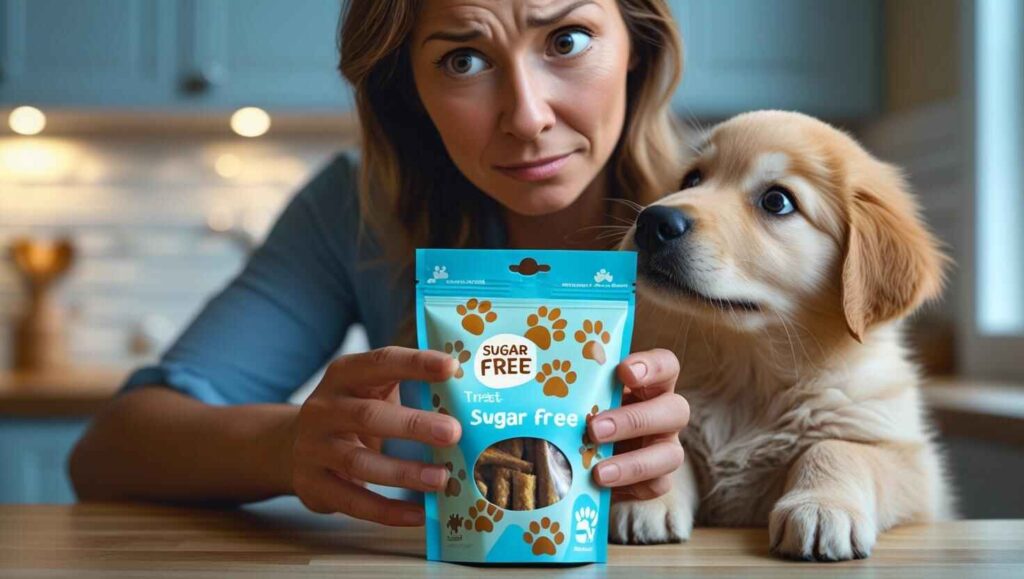What Are Artificial Sweeteners?
Artificial sweeteners are synthetic sugar substitutes that provide the sweet taste of sugar without the calories. While they’re a popular choice for humans trying to cut back on sugar intake, they can pose serious risks to dogs.
Common Types Found in Food
- Xylitol
- Aspartame
- Sucralose
- Stevia
- Saccharin
You’ll commonly spot these in products labeled as “sugar-free” or “low-calorie.”
Why People Use Them
- Manage weight
- Control blood sugar (in diabetics)
- Dental health
But what’s healthy for humans may be harmful—or even fatal—for dogs.
Can Dogs Process Artificial Sweeteners Like Humans?
Not exactly. Dogs have different metabolic systems than humans. Some substances, like xylitol, are processed very differently in a dog’s body, leading to a sudden release of insulin that can cause hypoglycemia (low blood sugar) and even liver failure.
Xylitol – The Most Dangerous Sweetener for Dogs

How Xylitol Affects Dogs
Xylitol is extremely toxic to dogs. Ingesting even a small amount can cause:
- Rapid insulin release
- Severe drop in blood sugar
- Seizures
- Liver failure
Symptoms of Xylitol Poisoning
- Vomiting
- Lethargy
- Loss of coordination
- Seizures
- Collapse
Emergency Treatment and Response
If you suspect your dog has ingested xylitol:
- Call your vet or emergency clinic immediately.
- Do not induce vomiting unless instructed.
- Provide the vet with details on what and how much was consumed.
Time is critical—early treatment can save your dog’s life.
Other Artificial Sweeteners: Are They Safe?
Aspartame
- Found in diet sodas, yogurt, and gum
- Generally considered non-toxic to dogs in small amounts
- Can cause mild gastrointestinal upset in large doses
Sucralose (Splenda)
- Not toxic to dogs
- May cause digestive issues like diarrhea if consumed in large amounts
Stevia
- A natural sweetener derived from plants
- Non-toxic to dogs, but high quantities may lead to digestive upset
Saccharin
- Rarely used today due to health concerns in humans
- Not toxic but not recommended for dogs
Important: “Safe” doesn’t mean beneficial—these substances have no nutritional value for pets.
Products That May Contain Hidden Sweeteners

Human Snacks and Candy
Always check labels. Sugar-free baked goods often contain xylitol.
Sugar-Free Gum and Mints
Certain brands contain a surprisingly high amount of xylitol—so much so that even a single piece could be deadly for a small dog.
Medications and Supplements
Even chewable vitamins or dental rinses may contain sweeteners harmful to dogs. Always read the ingredients.
Pros and Cons of Artificial Sweeteners for Dogs
Pros (When Prescribed by Vets)
- Rarely used in prescription medications
- May help in specialized diets (under strict veterinary supervision)
Cons (Health Risks)
- Toxicity (especially xylitol)
- Digestive issues
- No nutritional benefits
- Risk of accidental overdose
Natural Alternatives to Artificial Sweeteners
Safe Treats You Can Offer
| Safe for Dogs | Not Safe for Dogs |
|---|---|
| Carrots | Grapes |
| Apples (no seeds) | Chocolate |
| Blueberries | Raisins |
| Bananas | Xylitol gum |
Natural fruits in moderation can satisfy your dog’s sweet tooth safely.
How to Read Labels to Avoid Accidental Poisoning
- Look for ingredients like xylitol, sugar alcohol, or E967
- Be cautious with “sugar-free”, “low-carb”, and “keto” labeled products
- Check both active and inactive ingredients
When in doubt—don’t feed it to your dog.
What to Do if Your Dog Eats Artificial Sweeteners

- Don’t panic, but act fast.
- Contact your vet or emergency animal poison hotline.
- Note the amount and type of sweetener.
- Follow professional guidance exactly.
Early treatment can significantly improve your dog’s chances.
External Resources
FAQs
1. Is xylitol found in peanut butter?
Yes, some brands use xylitol as a sweetener. Always check labels before giving peanut butter to your dog.
2. What are early signs of sweetener poisoning in dogs?
Vomiting, weakness, staggering, and seizures are all warning signs that require immediate veterinary care.
3. Can artificial sweeteners cause long-term health issues in dogs?
Even if not toxic, regular ingestion of artificial sweeteners can irritate the digestive tract and may lead to long-term complications.
4. Is stevia safe for dogs?
Yes, in small amounts. Stevia is a plant-based sweetener that is non-toxic to dogs but should still be offered sparingly.
5. How much xylitol is toxic to dogs?
As little as 50 mg per pound of body weight can cause hypoglycemia. Just one piece of gum may be fatal for a small dog.
6. Should I keep all sugar-free products away from my dog?
Yes, absolutely. It’s better to be safe than sorry. Even a minor oversight can be life-threatening
Final Thoughts for Pet Owners
Artificial sweeteners might be safe for human consumption, but for dogs, they’re a gamble—especially xylitol, which is a known killer. The best way to protect your pet is through awareness and prevention. Always read product labels, avoid feeding dogs human snacks, and stick to dog-safe treats. When in doubt, consult your veterinarian.
#. YOU MAY ALSO LIKE:
Can I Use Cat Shampoo on My Dog?



